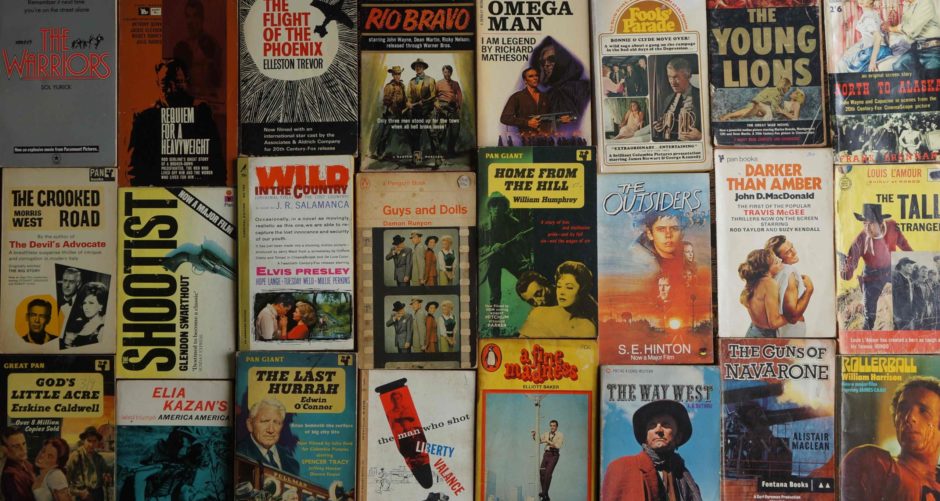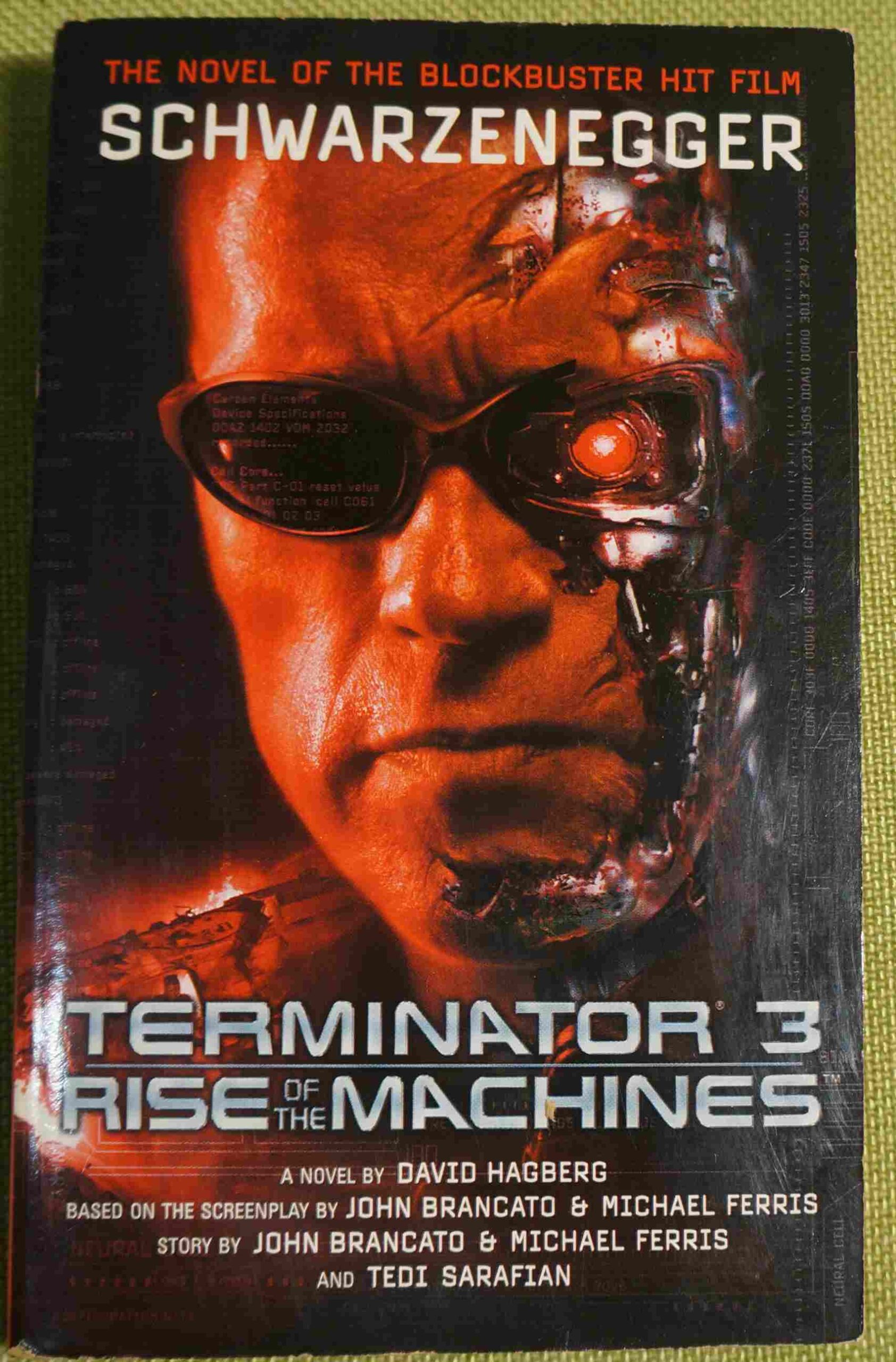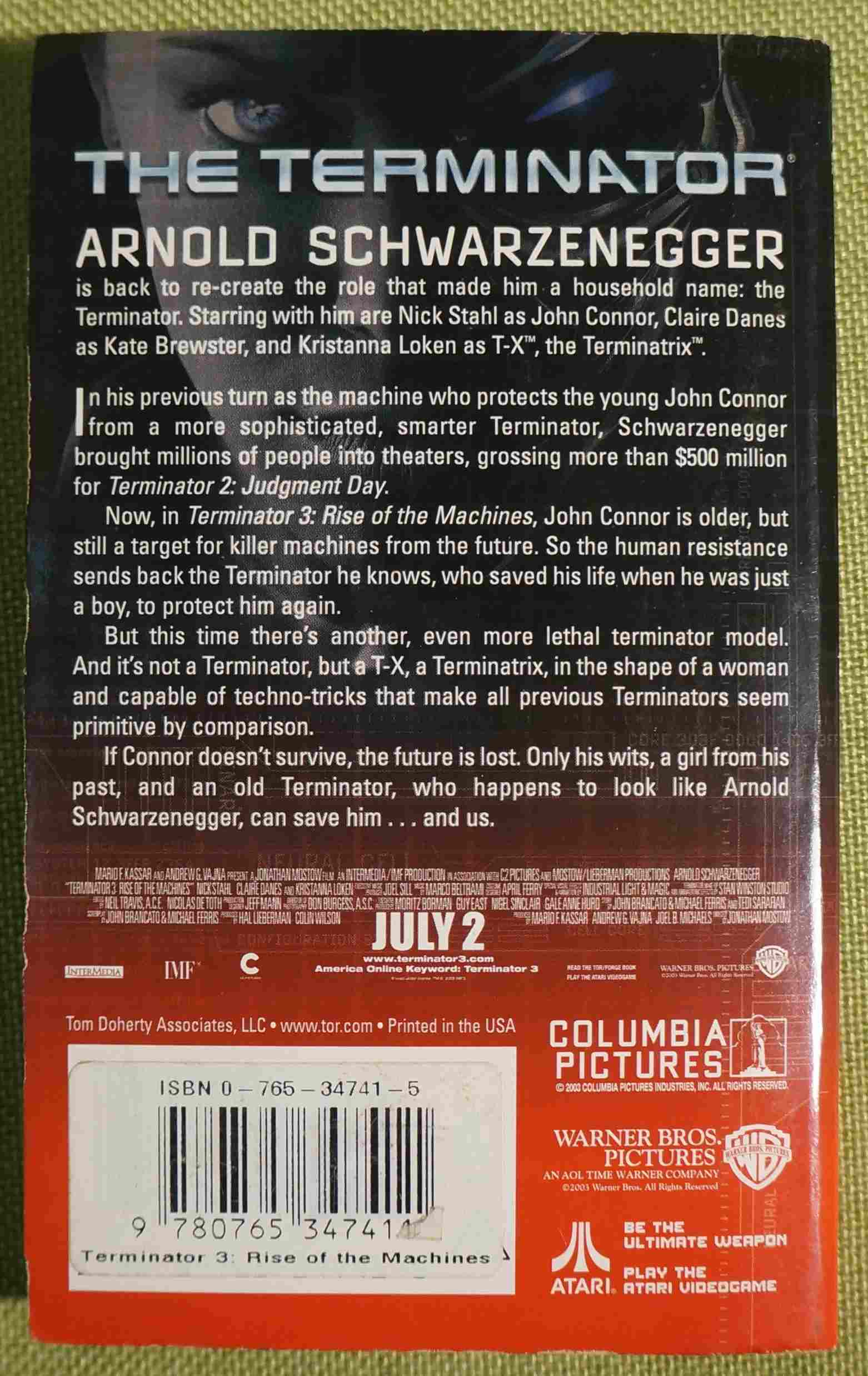FILM DIRECTOR: Jonathan Mostow
SCREENWRITER: John Brancato, Michael Ferris
FILM STARS: Arnold Schwarzenegger, Nick Stahl, Kristanna Loken, Claire Danes, David Andrews, Mark Famiglietti, Earl Boe, Jay Acovone
COUNTRY: USA
THIS BOOK
AUTHOR: David Hagberg
TYPE: Novelisation
PUBLISHER: Tom Doherty Associates Book
THIS EDITION PUBLISHED: 2003
COUNTRY: USA
COVER: Paperback
THE ORIGINAL BOOK
ORIGINAL AUTHOR: As Above
YEAR FIRST PUBLISHED: 2003
ORIGINAL BOOK TITLE: The film title
NOTES
GENRE: Sci Fi
WORDS: Which Terminator was this?
Like all franchises based around a very defined narrative premise the films start to look the same after a while and, usually, decrease in entertainment quality as familiarity sets in. Producers try to offset this but making things “bigger” (more action, more explosions, more elaborate set pieces) but, ultimately despite their efforts you get less bang (sic) for you buck.
The protagonists and antagonists are the same even if some of the characters are different. It’s same old same old with updated clothes.
The first Terminator (1984) was excellent. The second Terminator, Terminator 2 (1991), was perhaps (unusually for a sequel) even better. The story should have finished there, but there was more money to be made and so on it went.
Worse still what were essentially action films became more and more serious until the filmmakers (and their hardcore bolted on believer audience) were ultimately exploring philosophical concepts whilst pulling lint from their navels. It happens to many franchises, and usually sci-fi ones. I mean, most sci-fi is, rarely, based on anything remotely real. Even near future which I like but near future my ass – Just Imagine (1930) set in 1980, 2001 A Space Odyssey (1968) set in, errrr, 2001, and Blade Runner (1982) set in 2019 were way off base. And where is my hoverboard (Back to the Future II (1989)?) The world can’t figure out what’s going to happen tomorrow let alone what the “near” future will look like. The ball float toilet cistern is the best toilet system we have (OK, the most common) and they are forever leaking and, worse still, they are a farker to fix unless you have a plumbing degree so don’t talk to me about any dystopian future run by robots, cause I can hear the toilet leaking in the background. Until I have a replicant that can fix, and clean, my toilet I say fark off!
In any event, as audiences “grow up” they want to distance themselves from the youthful fun they had as young people watching these action movies (why, I don’t know ..people of all ages can enjoy well done but ultimately mindless action). So they add layers of meaning to the original premise which become so convoluted (probably because the original premise did not envisage philosophical layers and extra storylines being dumped on it) that one’s enjoyment is lost. If you want philosophy and meaning read a book written by a Greek scholar or a monk let the movies entertain
This strained seriousness has affected many franchises … Star Wars (1977) (a western crossed with a swashbuckler in space), Alien (1979) (a monster movie in space), Tron (1982) (OK more thoughtful than normal but how a guy transported into a video game led to the stupidities of Tron Legacy (2010) I don’t know), and any of the superhero franchises (for fark sake – they are just people in capes (the capes is a generalisation) doing good deeds). All these and more have been compromised or ruined by increasing seriousness or the need to be “dark” (because “dark” means “serious “and “grown-up”). No doubt some of the audience want this … because as they grow older they want people to think of them as serious adults. These are the same people who call comics “graphic novels” (which also have been largely compromised by increasing seriousness). I’ve read a few “graphic novels” and the meaning and darkness is only impressive because it’s being done as a comic .. you think “wow that was good … for a comic”. How can a comic ever say as much as a novel (or a film)? Books explain everything long hand, and films, entirely separate, work on a visual and emotive level by tapping into our memories of what we have seen and heard. I mean a tracking shot up a city street, a vista of mountains or a wide shot of a city are not easily described in a book and have their own (visual) language. Comics are both but not as much as either and neither here nor there.
I’ve strayed.
19 years had elapsed between the first Terminator film and Terminator 3 … yes, the original fans were 19 years older and many of them wanted more meaning. You have to keep them happy because the lovers of any franchise are the backbone to ticket sales … but you have to attract the kids.
Terminator 3 did that. It earnt $433.4 million worldwide and finished its theatrical run as the seventh-highest-grossing film of 2003 but there were diminished returns in quality (and legacy). Is anyone of any generation going today Terminator 3 was the best terminator film?
Terminator 3 was the terminator film which rehashed the first two but also set up the universe for the others that follow. What is particularly unsatisfying is it’s not a standalone film like the first two. You need to have seen the earlier films to be truly invested in what is going on.
What’s going on? Evil corporations, misguided individuals and smart robots lead to a worldwide catastrophe … and more sequels.
Pfffft.
It is what it is. Entertaining as long as you don’t think about it too much. You won’t be offended but you won’t be thrilled (despite some impressive set pieces) and you are unlikely to hold the film as high as the first two films.
James Cameron who directed the first two films is a better director than Jonathan Mostow who directed T3. Mostow’s films are slick and well made but Cameron, equally slick, has a little madness amongst his slickness.
Arnie is good but he isn’t giving us anything new … but then again should a cyborg give us anything new?
Screenwriters John Brancato and Michael Ferris were a American screenwriting duo, whose notable works include Watchers II (1990), Bloodfist II (1990), Femme Fatale (1991), The Net (1995), The Game (1997), Catwoman (2004), Primeval (2007), Terminator Salvation (2009), Surrogates (2009) and others, none of which are a recommendations. You don’t need two people to paint by numbers.
The franchise got worse.
There is no need to read the novelization. That is for the hardcore …. assuming they read.
LINKS
TRAILER



Another film I haven’t seen let alone a book I’ve never read. Keep the streak alive Frank!
Not the best way to start the Terminator series!